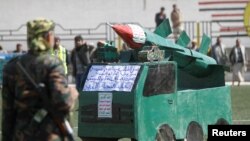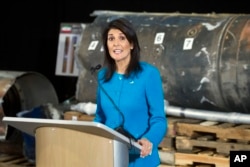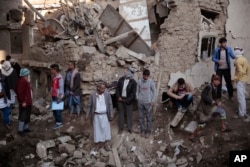The White House on Thursday condemned "in the strongest terms" this week's ballistic missile attack by Yemen's Iranian-backed Houthi rebels that apparently targeted the Saudi royal palace in Riyadh.
The missile that the U.S. said targeted the official residence of King Salman bin Abdulaziz Al Saud was the latest in a series of Houthi missile launches into Saudi territory.
White House spokeswoman Sarah Huckabee Sanders urged the United Nations to hold Iran responsible for "repeated and blatant violations" of Security Council resolutions on Yemen.
The White House and Saudi leaders have accused Iran of arming the Houthi rebels in Yemen with missiles, violating a 2015 Security Council resolution barring Tehran from exporting certain kinds of weapons unless it has council approval.
Iran does not deny backing the Houthis but does deny arming them.
'Undeniable' evidence
U.S. Ambassador to the United Nations Nikki Haley, speaking at a news conference last week, displayed missile debris she said was "undeniable" evidence that the weapons the Houthi rebels have been using are of Iranian origin.
Experts are split over whether the evidence Haley offered is conclusive of sanctions violations. But many say it is clear that the rebels are receiving some form of Iranian assistance.
Yemen's Houthi rebels claimed credit for Tuesday's missile attack, as well as a similar launch last month targeting Riyadh's international airport. The Saudis reported no casualties in either attack, saying the missiles had been intercepted while in flight.
After the November missile attack, Saudi Arabia imposed an air and sea blockade in Yemen, saying the move was necessary to prevent arms shipments from reaching the rebels.
Dire humanitarian situation
The White House statement welcomed the news that the Saudi-led coalition was reopening the Houthi-controlled port of Hodeida for at least 30 days to allow humanitarian and commercial shipments to Yemen's 27 million residents.
The United Nations and aid agencies had been warning that the monthlong blockade on the Hodeida was threatening Yemeni civilians who desperately need food and other aid. U.N. officials say 3 million people have been forced from their homes in one of the world's worst humanitarian crises.
U.N. Special Envoy to Yemen Ismail Ould Cheikh Ahmed expressed concern Thursday about an escalation of violence in the country. He condemned the latest Houthi missile attack on Riyadh, calling it "an escalation that hinders peace efforts in Yemen."
The Houthi rebels seized Yemen's capital of Sanaa in late 2014, forcing the country's internationally recognized president, Abdu Rabu Mansour Hadi, to flee to Saudi Arabia.
The Saudi-led coalition responded in March 2015 by launching airstrikes against the Houthis on behalf of Hadi's government.The airstrikes have killed thousands of civilians and wiped out entire neighborhoods, including hospitals.
The International Red Cross said there were 1 million suspected cases of cholera in Yemen, and that more than 80 percent of Yemenis lacked food, fuel, clean water and access to health care.
Ahmed, the U.N. envoy, said there was no military solution for Yemen. He said he was boosting efforts to contact the warring sides and prepare for resuming a political process.
Thursday's White House statement called on all parties to support a political solution in Yemen, saying it "is the only way to advance long-term stability in Yemen and end the suffering of the Yemeni people."
"As the largest humanitarian donor to the people of Yemen, the United States remains committed to alleviating the dire human suffering in Yemen," the statement said.
But Yemen voted for Thursday's U.N. General Assembly resolution disavowing the United States' recognition of Jerusalem as the Israeli capital and its plans to move the U.S. Embassy there.
Threat on US aid
President Donald Trump has warned of cuts in U.S. aid to countries that voted against America interests at the U.N. Yemen can scarcely afford to lose U.S. aid.
"There will be very close scrutiny and decisions made on that basis," U.S. Deputy Assistant Secretary of State Tim Lenderking said Thursday. "We have to measure that against the fact that there's a humanitarian catastrophe in Yemen."
Lenderking called the possible cuts in aid to those who voted against the U.S. on Thursday no "empty threat."
Reuters reported that airstrikes by the Saudi-led coalition in Yemen have killed at least 136 people since December 6.
The report quoted the spokesperson for the U.N. High Commissioner for Human Rights as saying, "We are deeply concerned at the recent surge in civilian casualties in Yemen as a result of intensified airstrikes by the … coalition, following the killing of former President Ali Abdullah Saleh in Sanaa on December 4."
VOA's Peter Heinlein at the White House and National Security Correspondent Jeff Seldin contributed to this report.







